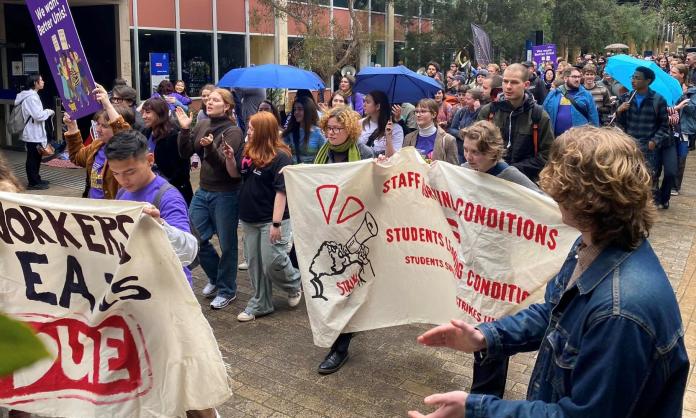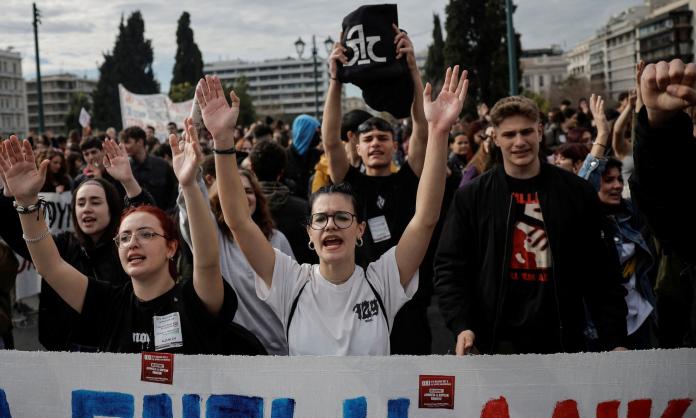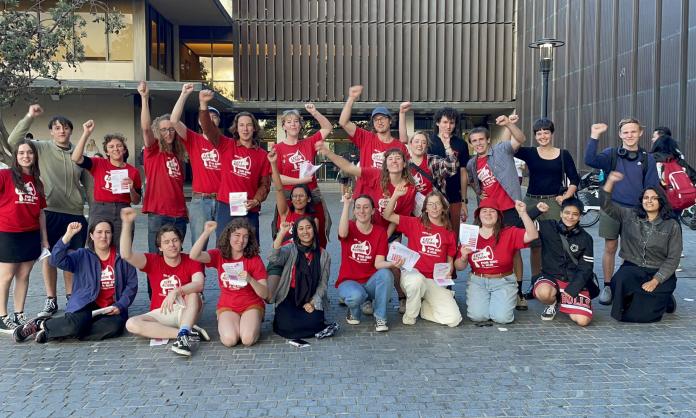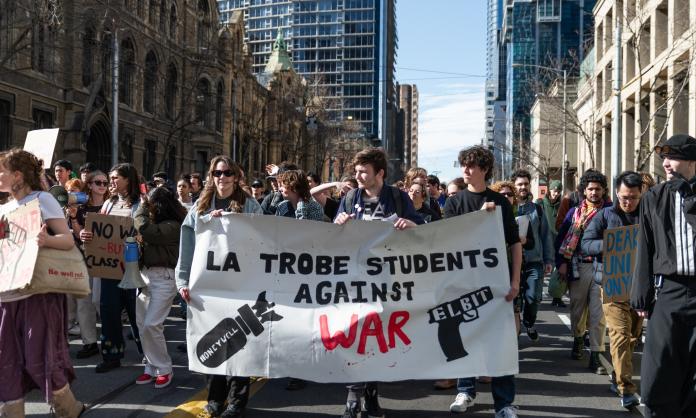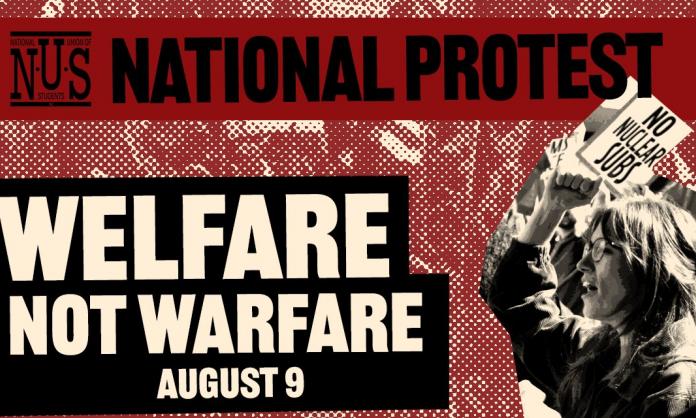It all feels a bit surreal. In a few short hours we’re walking off the job and embarking on one of the longest strikes at the University of Melbourne since 1856—when stonemasons downed tools to win the eight-hour day. It’s the longest major university strike in the history of our union, the National Tertiary Education Union.
The entire university is on a half-day strike, and staff in the faculty of arts, faculty of law, libraries, Victorian College of the Arts and student services (where I work) are staying out for the whole week. We’re fighting for permanent jobs, a pay rise above inflation, an end to constant restructures and manageable workloads.
It’s Monday and the clock hits 12:00—we walk out.
Our numbers grow as we make our way downstairs, collecting staff walking out on each floor. Union density in our building has grown in the weeks leading up to the strike. Existing members have recruited colleagues after previous one- and half-day actions. For the first time ever, we have more than 100 union members in the building.
Conditions in the university continue to deteriorate and have given an urgency to the union’s campaign. Workloads are unsustainable as vacancies go unfilled—there are work teams of a couple of dozen in our building with more than ten vacant positions. So our demand for all vacant positions to be filled is important. Restructures and job cuts have piled work on to fewer staff, so there’s a lot of support for our demand for strict limits on the number of restructures management can put us through. The rising cost of living weighs on us—our colleagues earning the median female full-time wage have fallen more than $80 per week in real terms over the past two years.
We gather on the ground floor and march into the late winter sun.
We hear about one of our workmates joining the union just 30 minutes before the strike began. He works in the university call centre and had used his short breaks between phone calls to fill out the online form. He’s marching alongside us, smiling from ear to ear, decked out in union merch.
We march on, meeting hundreds of workers from across the university to rally under Vice-Chancellor Duncan Maskell’s office. Maskell earns in a fortnight what many of us in student services earn in an entire year.
After the rally, we plan Tuesday’s actions. We’ll be picketing our building for the first time, and we’re determined to make it a success.
We speak to everyone coming into the building. We explain our demands, ask them to join the union and to join us on the picket line. We get word from inside that things aren’t looking good in the call centre. Students are waiting more than twenty minutes to speak to someone—last week they were waiting twenty seconds. A cheer rings out across the picket line.
I meet a worker from the floor above mine. She’s going to work for the day, but feels uneasy about crossing the picket line. She knows she should join us, but she’s nervous about what her managers will do. We talk it all through. The next day she’s with us on the picket, and stays out on strike for the rest of the week.
People I’ve passed on the stairs or seen in line for coffee are leading chants, running meetings and speaking to crowds of hundreds. Seeing people rise to the challenge and occasion of the strike is deeply inspiring.
Thursday, four days into the strike, is the university census date. It’s one of the busiest times of the year for us in student services and we’re organising a rally outside our building. More of our workmates have joined the strike, convinced by conversations on picket lines and their own experience working here day in day out.
At the rally, a worker from the equity and disability support team tells us about chronic understaffing in the team that assists the more than 2,000 enrolled students with a disability. Another from a team that helps people apply for courses talks about workmates going on stress leave as the number of unanswered emails reaches into the thousands.
It’s the same story across the building: we’re too overworked and understaffed to give students the support they need and deserve. We’re being asked to do more and more, with less and less.
As the rally is wrapping up, we hear that the university executive, including Duncan Maskell, is meeting a few buildings over.
We head over, hoping to catch a glimpse. He’s not brave enough to leave the building while the striking staff are outside. Instead, he sneaks out a side door. A few of us spot him and words are exchanged. Maskell thinks we should be happy that the university is offering us a below inflation pay rise. As he slips into his chauffeur driven car, the chant of the week follows behind him. It’s a riff on the football-style chant popularised by the Jeremy Corbyn campaign in Britain a few years ago: “MOOORE PERMANENT JO-OBS!”
More than half of the workforce of 12,000 are on insecure casual or fixed-term contracts, some for decades on end. We’re demanding a minimum of 80 percent of people be employed on secure, ongoing contracts.
We don’t know what will happen after the strike, or what impact it will have on our campaign. We’re up against a deeply entrenched business model. And our top union leadership has a long track record of offering concessions (like their 15 percent wage cut idea from 2020) rather than leading a fight. We hope our strike will force management to cede to our demands, but we’re already preparing for more action if necessary.
For us in student services, it’s been transformative. The decision to strike for a week wasn’t taken lightly, and we weren’t certain we’d pull it off. But, as the week draws to a close, we know we made the right decision. As one our colleagues addressed the rally on Thursday:
“In my role, Just over a year ago, on my insecure contract, I was one of two NTEU members in my team. As of today, we have a union density in our team of 83 percent.
“There is no better way to radicalise your staff than to say that nothing can change for the better, while things are getting worse around you. To be told there is no budget, when management spends $38 million on consultants.
“So we weren’t being heard then. But we are now! This strike is a result of hard work from rank-and-file members. From everyone here today, from the people speaking today, and you yourselves. So let’s just use this as an opportunity to expand our numbers, to raise our confidence, and have our demands met.”
Another of our workmates sums it up: “I swear, every day I hear more stories that just solidify for me why we are striking”.




